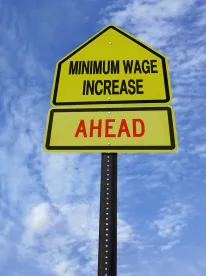By overwhelming majorities, voters in Arkansas and Missouri have approved incremental minimum wage increases over the next several years.
In Arkansas, Issue 5 (the Minimum Wage Increase Initiative (2018)) was approved by a margin of approximately 68% to 32%. With passage of the initiative, Arkansas’s current minimum wage of $8.50 per hour will increase to $9.25 per hour on January 1, 2019; to $10.00 per hour on January 1, 2020; and to $11.00 per hour on January 1, 2021. The minimum wage increase is estimated to affect about 300,000 employees.
Similarly, in neighboring Missouri, Proposition B (the $12 Minimum Wage Initiative (2018)) was approved by voters with a margin of approximately 62% to 38%. With its passage, the minimum wage in Missouri will increase from its current rate of $7.85 per hour to $8.60 per hour on January 1, 2019; to $9.45 per hour on January 1, 2020; to $10.30 per hour on January 1, 2021; to $11.15 per hour on January 1, 2022; and to $12.00 per hour on January 1, 2023. Thereafter, the minimum wage may increase or decrease each year based on changes in the Consumer Price Index for Urban Wage Earners and Clerical Workers (CPI-W). An estimated 677,000 employees will be affected.
In addition to increasing the minimum wage, Proposition B increased the available damages for an employer’s violation of the minimum wage statute, by allowing recovery of liquidated damages in an amount equal to twice the amount of actual damages. Moreover, the new law extended the statute of limitations for bringing a minimum wage claim, from two years to three. Notably, government employers are exempt from the minimum wage increases in Missouri.




 />i
/>i

